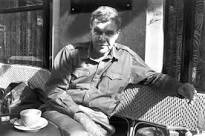Friday, January 6
On November 21, Monday of Thanksgiving Week, I published the poet Ray Carver for the first time, a new voice for me. That morning I introduced the post thus: “I found a new poet for the occasion. Ray Carver (1838-1988), never met him before. Reading “Happiness” on a morning like this helps me breathe. You too, I hope. I want to get to know him some more.”
Over the break, one of our readers sent me another. This one, “Late Fragment,” makes me want to get to know him some more again; maybe that’s a good definition of the expression, “ . . . get to know him some more”: the early stages of friendship begun from his place in the grave to “Work Day/Hard Time” readers alive in the world now.
Have a blest weekend.
john st sj
Today’s Post “Late Fragment”
And did you get what
you wanted from this life, even so?
I did.
And what did you want?
To call myself beloved, to feel myself
beloved on the earth.
p.s.
citing part of a wikipedia biographical sketch can be a risky business and gave me pause just now. This account, titled “Decline of first marriage” is written with grace and spare prose, offering readers a story of loss and love and loss that frames today’s short poem. So here it is.
Decline of First Marriage”
The following excerpt from Scott Driscoll’s review[9] of Maryann Burk Carver’s 2006 memoir[10] describes the decline of Maryann and Raymond’s marriage.
The fall began with Ray’s trip to Missoula, Mont., in ’72 to fish with friend and literary helpmate Bill Kittredge. That summer Ray fell in love with Diane Cecily, an editor at the University of Montana, whom he met at Kittredge’s birthday party. “That’s when the serious drinking began. It broke my heart and hurt the children. It changed everything.”
“By fall of ’74”, writes Carver, “he was more dead than alive. I had to drop out of the Ph.D. program so I could get him cleaned up and drive him to his classes”. Over the next several years, Maryann’s husband physically abused her. Friends urged her to leave Raymond.
“But I couldn’t. I really wanted to hang in there for the long haul. I thought I could outlast the drinking. I’d do anything it took. I loved Ray, first, last and always.”
Carver describes, without a trace of rancor, what finally put her over the edge. In the fall of ’78, with a new teaching position at the University of Texas at El Paso, Ray started seeing Tess Gallagher, a writer from Port Angeles, who would become his muse and wife near the end of his life. “It was like a contretemps. He tried to call me to talk about where we were. I missed the calls. He knew he was about to invite Tess to Thanksgiving.” So he wrote a letter instead.
“I thought, I’ve gone through all those years fighting to keep it all balanced. Here it was, coming at me again, the same thing. I had to get on with my own life. But I never fell out of love with him.”

